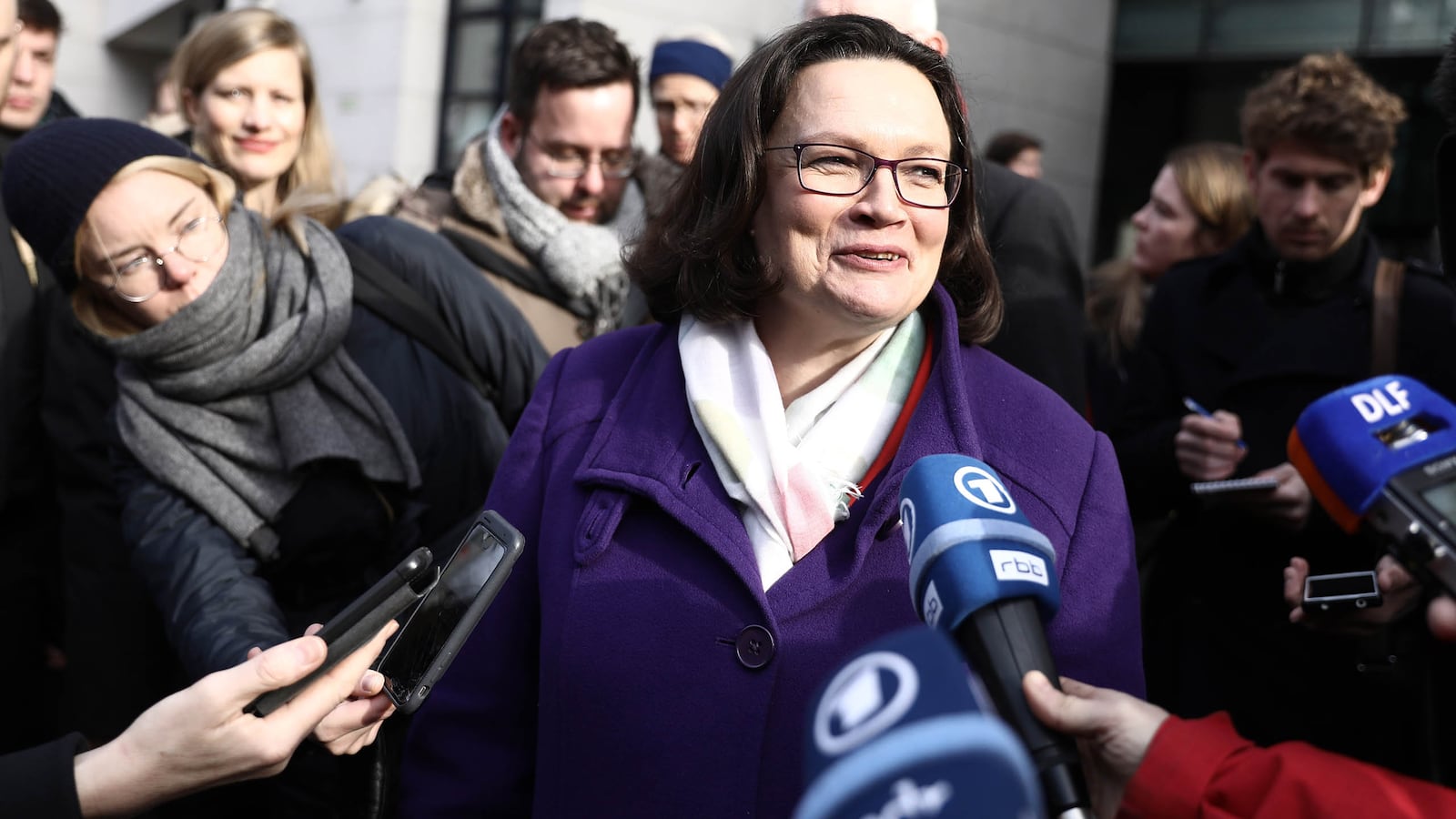BERLIN—After a final stretch of sleepless nights and suicide jokes, the leadership of Germany’s Social Democratic Party announced Sunday morning that its members have given it the green light to do what nobody else in German politics seems keen on doing: form a government with Angela Merkel’s Conservatives.
Merkel congratulated the Social Democrats on “a clear result” in their vote, where more than 66 percent of the party members supported another “grand coalition” (GroKo) between the two parties.
The announcement means that Merkel will be re-elected as chancellor for another four-year term. And, after last fall’s elections, Germany will finally have a government.
But the result is a bitter formula for the SPD’s youth wing, who concluded their #nogroko tour around Germany in Hamburg last week.
Kevin Kühnert, the 28-year-old politics student in charge, looked casual in a black long-sleeved shirt and jeans as he recited the usual talking points: that for the SPD to reinvigorate itself after it got all-time low election results last September it must go into opposition.
The SPD’s leadership, frightened by the possibility of new elections, insisted again and again that there was no Plan B to GroKo.
In fact, another alternative could have been a Merkel-led conservative minority government. Would they have done it if the SPD had voted no? Merkel gave very mixed signals.
“It’s amazing,“ political scientist Timo Lochocki tells us. “Merkel presents herself as this politician who is just acting for the greater good, and people think that she ends up in power by coincidence.“
Now that the Social Democrats are once again in cahoots with the Conservatives, this leaves the anti-immigrant and nationalist Alternative für Deutschland (AfD) party as Germany’s main opposition party—arguably stronger than it was before.
A weak SPD runs the risk that it will fail to win back left-leaning voters, and might lose even more.
In the Ruhr area, which was once Germany’s coal heartland, complete with pubs and eateries for miners to come together and socialize, the Social Democratic party used to mean a lot to people. But this has changed. Some residents are shifting their support to the AfD.
Meanwhile, the AfD claims to be, as one of its lawmakers put it, a “new people’s party that cares about the little people”—note that the SPD used to call the working class “workers” and not the “little people.”
For this AfD, such concern about workers is full of irony. The party is spearheaded by a mix of real life nobility and wannabes such as party leader Alexander Gauland, who appears to be obsessed with fashion choices and a lineage of lords that make up his rose-tinted view of the British aristocracy.
But even if Gauland’s expression suggests he is more at home shaking hands with a disgruntled Wagner connoisseur at the Bayreuth music festival than chatting with the plebs, his party has still managed to overtake the Social Democrats in several former SPD strongholds and eastern states.
In the northern city of Cottbus, for example, recent polls saw the AfD score the strongest results while the SPD sank to half of its previous ratings. The mayor said the situation was emotional.
This is not so much because workers or unions think that someone like Beatrix von Storch (the granddaughter of Hitler’s finance minister) is their comrade. “Most of the AfD voters are still protest voters,” according to the political scientist Oskar Niedermayer. “They can still be won back.” But until then, there is one party seeking to provide solace to those feel left behind with stories to direct their anger at those who are even worse off.
Last week, there was trouble in Essen, when a pensioner named Jörg Sartor, who runs the city’s food bank, was thrust into the national spotlight overnight, after he introduced an (illegal) rule to the food bank’s website, according to which only people with German passports would be permitted to sign up as members.
The reason, Sartor explained, was that some of the younger male refugees who came to the food bank were cutting ahead of elderly women and single mothers. And he was worried that the elderly women would be intimidated and not come back.
These kind of tensions aren’t new, especially when there is a language gap. And when there is not always enough food available. (Even though Germany’s economy is booming, the number of people who need to go to food banks for groceries is increasing).
Other centers in Germany have hired a translator or given special time slots to elderly and sick people. Sator, a gruff man who works six days a week, has now consulted refugee groups to help come up with a better solution.
When Udo Reil, a long-time SPD supporter turned AfD politician, came to visit the food bank, Sartor was not in a good mood. Someone had spray-painted “Nazi” on his delivery truck and the doors of the building. He was annoyed about the politicians who were using his food bank to make a point. “I didn’t talk to him,” he said.
Oh, and Martin Schulz, who was still rising high in the polls against Merkel around this time last year? After a bad election result, SPD members may have forgiven their leader for going back on his word and entering coalition talks with Angela Merkel. But that he was angling for a position as foreign minister in the new government, too? No.
Schulz resigned. In his place, the SPD is predicted to elect former Labor Minister Andrea Nahles next month. She will be the first female leader in the party’s history. The Social Democrats have not named their candidates for ministerial positions yet.





